A former Jewel grocery store bagger Vietnam serviceman and American Arab activist remembers Muhammad Ali and what he meant to his life
By Ray Hanania
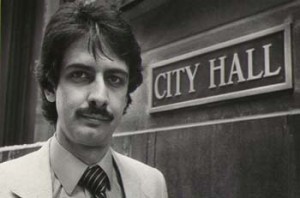
Ray Hanania, City Hall Reporter, (1976-1992)
Other than my family and parents, no one had more of an impact on my life than Muhammad Ali.
Ali was already a celebrity and an up-and-coming heavyweight champion when I met him in 1968. I was working as a bagger at Jewel at 87th and Stony Island back when Chicago was racially divided and Whites and Blacks lived apart, with great animosity.
Ali would come to the Jewel in a brand new Lincoln Mark II and accompanied by a bodyguard, whose sister happened to be a friend of my mother – both were from Palestine.
Racial tensions forced many people to flee Chicago’s violence and resettle in the suburbs. That violence in Chicago continues. I’m still shocked that as many as 69 people were injured or killed in gun related violence over the Memorial Day weekend. That’s scary.
Ali would always single me out at the Jewel and have me carry his bags. I was the darkest employee at the store back then, being Middle Eastern. And that was great because he would tip me $1. And $1 would go a long way in 1968.
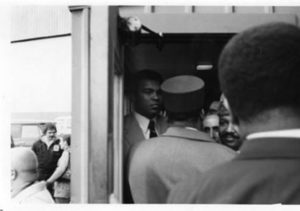
Muhammad Ali waits for the arrival of UAE Sultan Bin Mohammad al-Qasimi at Butler Terminal at Midway Airport in May 1976. Photo copyright (c) 2016 Ray Hanania. All Rights Reserved
That was a tough period in American and Chicago history. The 1960s was consumed with the Vietnam War, racial tensions and even threats of Middle East terrorism. American Arabs like me were targeted by the government. Most Hollywood movies portrayed all Arabs as villains and killers and it was tough as a kid to go to a movie and see that all the terrorist movie characters looked like my uncles and cousins.
Although Ali refused to serve during the Vietnam War, I enlisted a few years later and served until the war ended. Despite being honorably discharged from military service, the FBI launched an intensive campaign investigating me for two full years.
Maybe because in 1976 I had the opportunity to write about the visit of a wealthy Sheik from Sharjah, a desert kingdom in the United Arab Emirates, Sultan Bin Mohammed al-Qasimi, to Chicago’s Southwest Side.
Sheik al-Qasimi visited a storefront mosque at 48th and Ashland Avenue. Chicago aldermen embraced a policy to prevent Muslims from opening mosques in Chicago, at the time, with the exception of mosques run by the Nation of Islam.
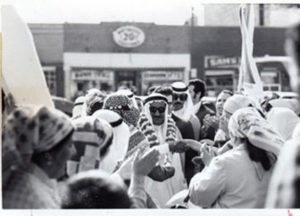
UAE Sultan Bin Mohammad al-Qasimi visits one of Chicago’s only Arab mosques at 48th and Ashland in May 1976. Photo copyright (c) 2016 Ray Hanania. All Rights Reserved
Ali was at Midway Airport at Butler Terminal when al-Qasimi arrived and I was able to get his photograph. Ali converted to Islam after defeating Sonny Liston in 1964 and was very involved with the Nation of Islam. He traveled to the Middle East in 1974 and expressed support for the Palestinians.
Every Arab family would stop what they were doing and tune in to the radio whenever sportscaster Howard Cosell would call each of Ali’s big championship heavyweight bouts.
Even though my family is Christian Arab, we were so proud of Ali, a Muslim, for his success. People were afraid back then to standup for the rights of Palestinians and Arabs. But he wasn’t.
By the way, the FBI report asserted on the first of 40 pages that I was “suspected” of “terrorist activities” but concluded after two years and hundreds of thousands of wasted tax dollars that I was just an American proud of my Arab heritage who wanted to help his community.
That inspired me to write my humor book, “I’m Glad I Look Like a Terrorist: Growing up Arab in America,” which shared with readers, in a humorous way, what it was like growing up Arab in this country.
Ali didn’t need me to explain what I was going through. He went through it as an African American. He wasn’t afraid to challenge the establishment and speak out against injustice.
The mainstream news media wrote about him often, but downplayed or ignored his activism in support of American Arabs and Palestinians.
When he died last week, a powerful voice for freedom and justice in America died with him.
(For additional information and a more extended commentary including Ray Hanania’s podcast audio commentary, click here to view The Arab Daily News online news commentary.)
Use this widget to play the audio podcast:
Use this widget to listen to a podcast of Ray Hanania’s live radio show in Detroit and Washington DC discussing the life and times of Muhammad Ali:
(Ray Hanania is an award winning former Chicago City Hall reporter and columnist. Email your comments to [email protected].)
RayHananiaINN
Hanania covered Chicago political beats including Chicago City Hall while at the Daily Southtown Newspapers (1976-1985) and later for the Chicago Sun-Times (1985-1992). He published The Villager Community Newspapers covering 12 Southwest suburban regions (1993-1997). Hanania also hosted live political news radio talkshows on WLS AM (1980 - 1991), and also on WBBM FM, WLUP FM, WSBC AM in Chicago, and WNZK AM in Detroit.
The recipient of four (4) Chicago Headline Club “Peter Lisagor Awards” for Column writing. In November 2006, Hanania was named “Best Ethnic American Columnist” by the New American Media;In 2009, he received the prestigious Sigma Delta Chi Award for Writing from the Society of Professional Journalists. Hananiaalso received two (2) Chicago Stick-o-Type awards from the Chicago Newspaper Guild, and in 1990 was nominated by the Chicago Sun-Times for a Pulitzer Prize for his four-part series on the Palestinian Intifada.
Latest posts by RayHananiaINN (see all)
- Baby Boomers, red meats and an obsession with weight - June 14, 2016
- Remembering Muhammad Ali - June 13, 2016
- First annual Chicago Open Air Fest expands - June 9, 2016

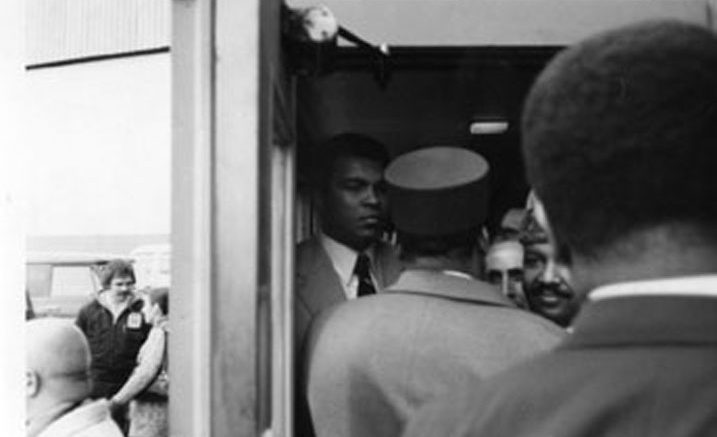
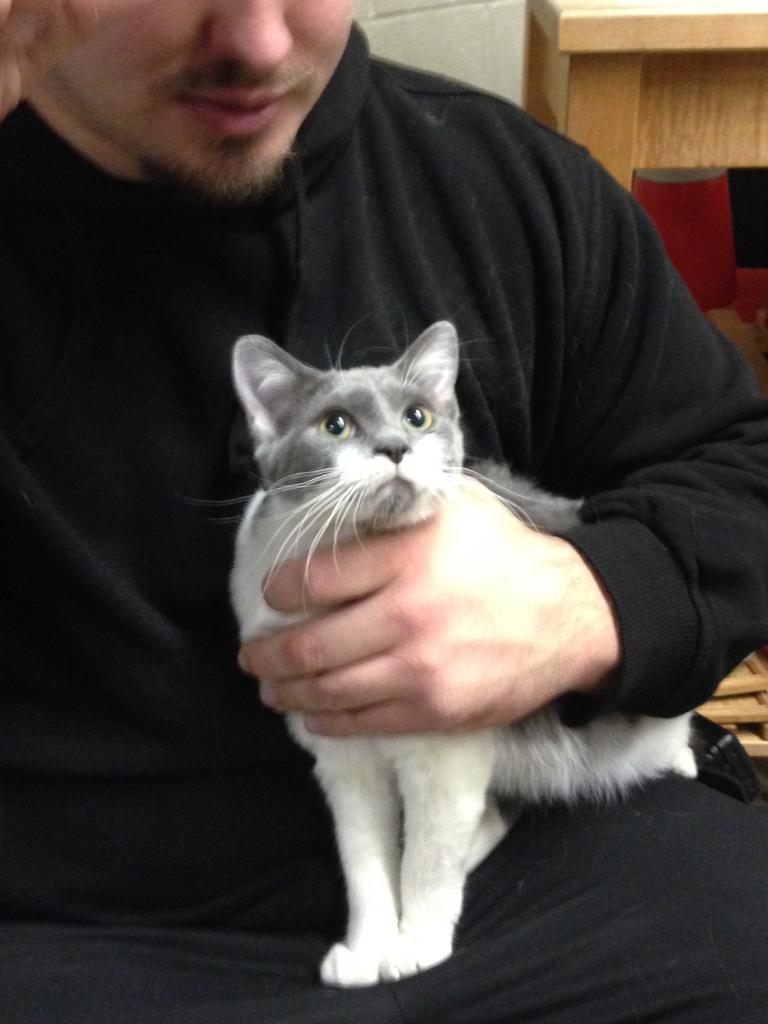

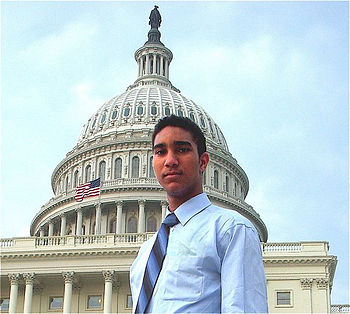
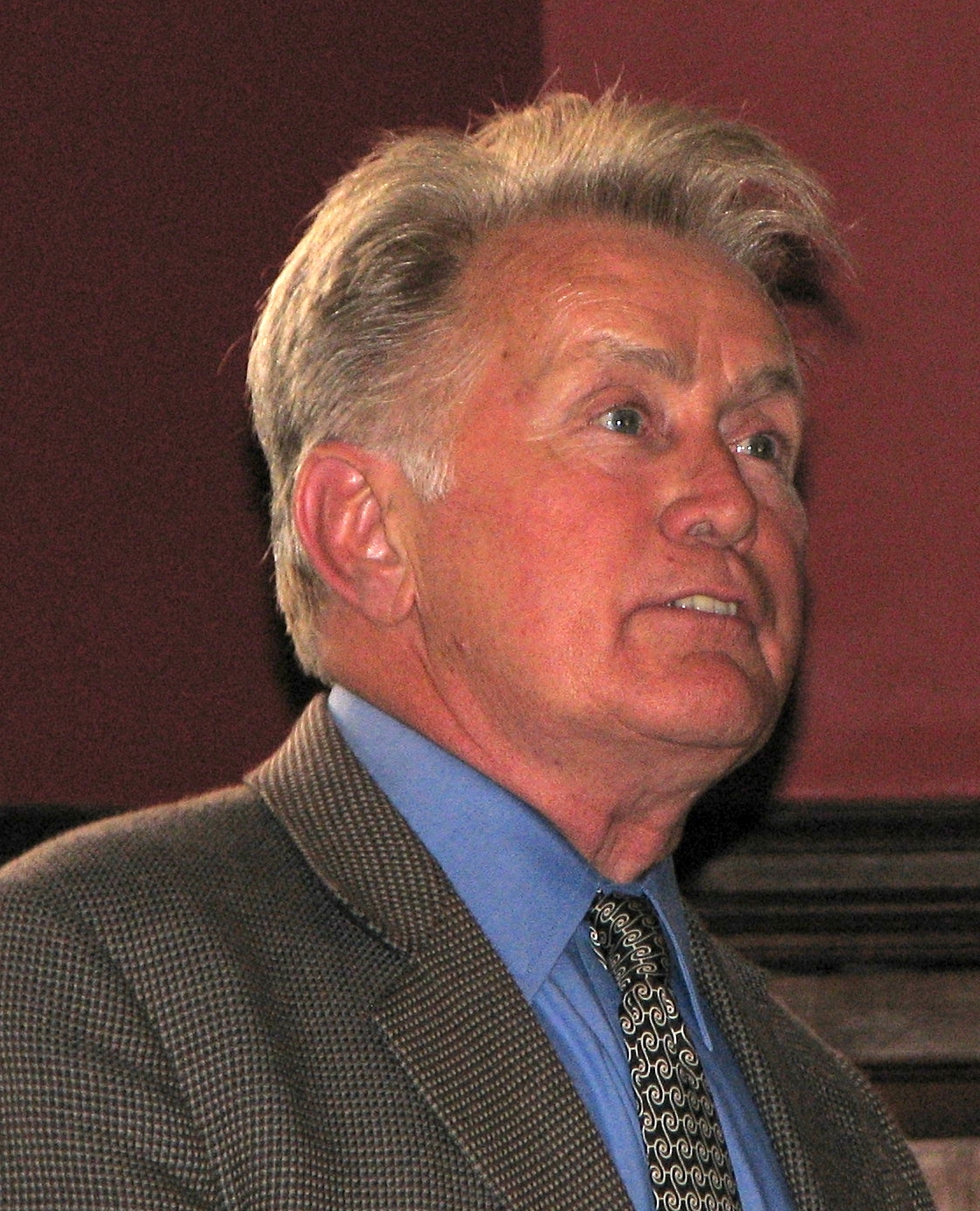
Pingback: C?vata()